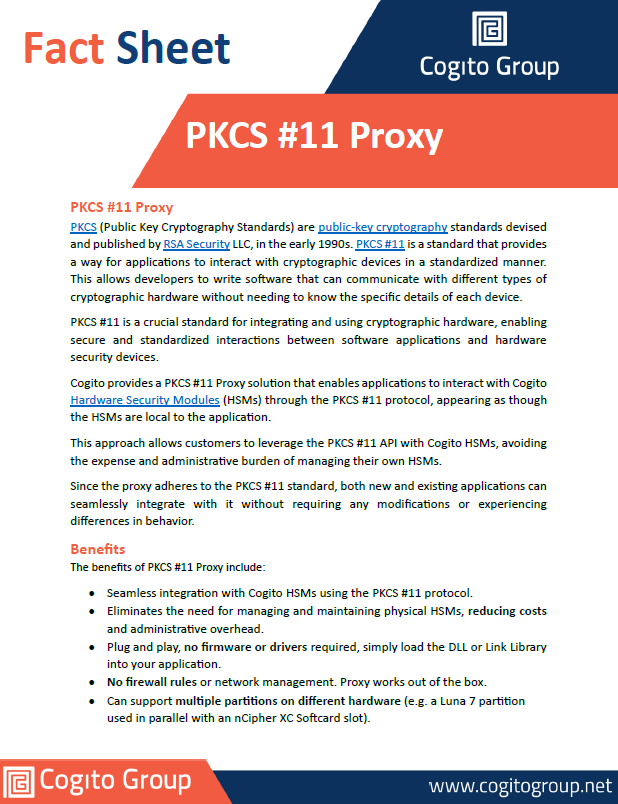PKCS #11 Proxy
PKCS #11 Proxy
PKCS (Public Key Cryptography Standards) are public-key cryptography standards devised and published by RSA Security LLC, in the early 1990s. PKCS #11 is a standard that provides a way for applications to interact with cryptographic devices in a standardized manner. This allows developers to write software that can communicate with different types of cryptographic hardware without needing to know the specific details of each device.
PKCS #11 is a crucial standard for integrating and using cryptographic hardware, enabling secure and standardized interactions between software applications and hardware security devices.
Cogito provides a PKCS #11 Proxy solution that enables applications to interact with Cogito Hardware Security Modules (HSMs) through the PKCS #11 protocol, appearing as though the HSMs are local to the application.
This approach allows customers to leverage the PKCS #11 API with Cogito HSMs, avoiding the expense and administrative burden of managing their own HSMs.
Since the proxy adheres to the PKCS #11 standard, both new and existing applications can seamlessly integrate with it without requiring any modifications or experiencing differences in behavior.
Benefits
The benefits of PKCS #11 Proxy include:
- Seamless integration with Cogito HSMs using the PKCS #11 protocol.
- Eliminates the need for managing and maintaining physical HSMs, reducing costs and administrative overhead.
- Plug and play, no firmware or drivers required, simply load the DLL or Link Library into your application.
- No firewall rules or network management. Proxy works out of the box.
- Can support multiple partitions on different hardware (e.g. a Luna 7 partition used in parallel with an nCipher XC Softcard slot).
Design
The PKCS #11 Proxy is deployed as a Dynamic Link Library (.dll) in Windows and as a Shared Object (.so) in Linux.
The general overview of behavior is as follows:
- The Cogito PKCS #11 Proxy is loaded by your application as a .dll or .so file (as normal for PKCS #11 Applications).
- The Proxy securely authenticates to Jellyfish and retrieves all available HSMs and Partitions for your tenancy.
- The client Application then interfaces with Cogito HSMs as if they were local to it.

The Jellyfish microservice network is fault tolerant and provides excellent reliability. Jellyfish Cloud has dedicated servers in multiple data centres throughout the country.
All secrets are encrypted between the end device and the Cloud HSM (Hardware Security Module). This not only prevents man in the middle attacks but also means your secrets are never seen by the Jellyfish network. Additionally, all HSM equipment used by Jellyfish Cloud has tamper protection. Unauthorized access to the physical devices will clear all stored keys. However, your keys are not lost and will still exist in at least 1 other HSM in another datacenter.




